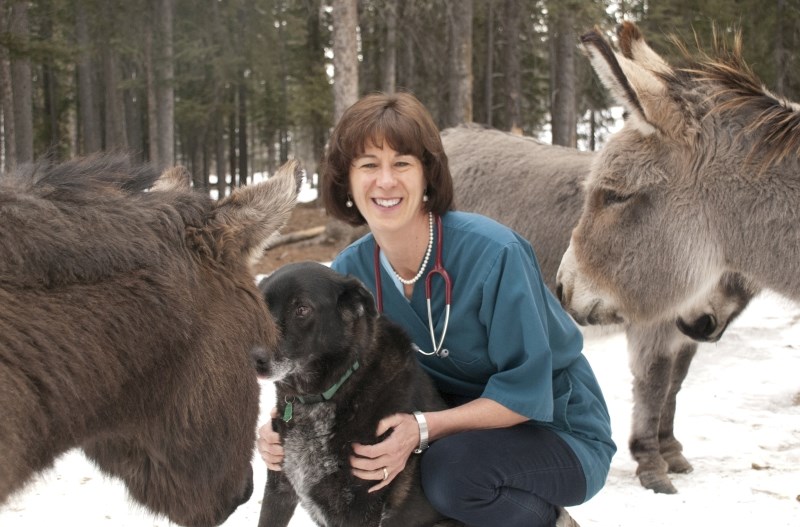“Even when we cannot see them, we know they are there.”
So begins Dogs With No Names: In Pursuit of Courage, Hope and Purpose, the recently released debut book of Dr. Judith Samson-French, a Bragg Creek-based veterinarian and head of the Dogs with No Names (DWNN) initiative.
Samson-French, along with a slew of dedicated volunteers, run the project; travelling to First Nations communities of Tsuu T’ina and Siksika to care for the homeless dogs, deworming them and implanting the females with an innovative contraceptive.
The book, full of interesting, real-life anecdotes and beautiful images, was released in November. With 100 per cent of the proceeds going to support the project with the same name, the book documents all the DWNN team has learned since they began four years ago.
“Every time you go out to see the dogs, you encounter situations and interactions that are unusual — I’d drive home thinking of these experiences,” said Samson-French, owner of Banded Peak Veterinary Hospital. “So, I’d come home and write down my personal thoughts…. The book came about when I started to notice clear patterns emerging from every trip we took there.”
In two months, the book has sold about 1,000 copies, said the author. In addition, it has been endorsed by the likes of the Jane Goodall Institute of Canada and the Alliance for Contraception for Cats and Dogs. And that’s before finalizing a promotion package for the book.
“The book has been really well received,” said Samson-French with a smile. “It’s opening the door for other people who are trying to work with rescues. It’s helping them to understand the behaviour of these dogs.
“These dogs are allowed to behave like dogs. Yes, there is incest and cannibalism. We don’t think of that when we’re looking at our dear, little Yorkshire terrier.”
So far, there hasn’t been an official tally of the proceeds from the book, but Samson-French said she’s feeling positive about support for the program’s future. Until recently, she was funding the project personally. But, thanks to a September fundraiser and private donations, the project is moving forward.
Already more dewormer and implants have been purchased, and the project has begun to grow beyond the two original First Nations communities to include a third: the Eden Valley reserve.
“We’re growing. We are looking into remote and Arctic communities where they have no vet care,” said Samson-French, a native of Montreal. “We wouldn’t haven’t started making contacts with people there if we hadn’t had additional funding. We would have just stayed based on Tsuu T’ina and Siksika Nations.”
Living in Bragg Creek, with her vet practice across the highway from the Tsuu T’ina nation, the veterinarian said she got the idea for the project after watching and handling the many unwanted dogs she saw regularly. The problem was, quite literally, in her backyard.
So far, the group has inserted about 141 implants. Of those, only one has failed.
Samson-French estimated the initiative has prevented about 100,000 homeless dogs from being born — that’s 100,000 less dogs wandering the highways, and entering into humane societies and rescue facilities.
For everything she’s learned about the nameless dogs living in First Nations communities, Samson-French said she’s learned just as much about the “named” dogs that live as companions amongst us.
“They’ve submitted to all of our whims and wants,” she said. “The dogs in our company have obeyed our social contract — not to bite and to sit where we want. We’ve put so many limitations on our dogs, I’m surprised they don’t go crazy.”
Really, she said all dogs need to live a happy life is food; shelter from the elements and a bit of love.
In response to this, Samson-French has written a second book, 39 Ways To Kill Your Best Friend: Tales of Caution for Dog Owners, about the “demise” of owned dogs. Written at the same time as her first book, Samson-French said to expect 39 Ways to hit bookstore shelves in about six months.
Dogs With No Names: In Pursuit of Courage, Hope and Purpose can be purchased online at amazon.ca and dogswithnonames.com. In Cochrane, the book can be found at Bentleys Books and Country Paws Dog Daycare.
For more information on the initiative and the book, check out dogswithnonames.com.




